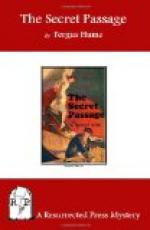“Yes. The gambling-house. What of her?”
“Well, she seems to be implicated in the matter.”
“In what way?”
Jennings related the episode of the photograph, and the incident of the same perfume being used by Mrs. Herne and Maraquito. Peggy nodded.
“I don’t see how the photograph connects her with the case,” she said at length, “but the same perfume certainly is strange. All the same, the scent maybe fashionable. Hikui! Hikui! I never heard of it.”
“It is a Japanese perfume, and Maraquito got it from some foreign admirer. It is strange, as you say.”
“Have you seen Mrs. Herne?”
“I saw her at the inquest. She gave evidence. But I had no conversation with her myself.”
“Why don’t you look her up? You mentioned you had her address.”
“I haven’t it now,” said Jennings gloomily. “I called at the Hampstead house, and learned that Mrs. Herne had received such a shock from the death of her friend, Miss Loach, that she had gone abroad and would not return for an indefinite time. So I can do nothing in that quarter just now. It is for this reason that I have come here to ask about Maraquito.”
“From Papa Le Beau,” said Peggy, wrinkling her pretty brows. “What can he know of this woman?”
“She was a dancer until she had an accident. Le Beau may have had her through his hands.”
“Maraquito, Maraquito,” murmured Peggy, and shook her head. “No, I do not remember her. How old is she?”
“About thirty, I think; a fine, handsome woman like a tropical flower for coloring.”
“Spanish. The name is Spanish.”
“I think that is all the Spanish about her. She talks English without the least accent. Hush! here is papa.”
It was indeed the little Professor, who rushed into the room and threw himself, blowing and panting, on the dingy sofa. He was small and dry, with black eyes and a wrinkled face. He wore a blonde wig which did not match his yellow complexion, and was neatly dressed in black, with an old-fashioned swallow-tail coat of blue. He carried a small fiddle and spoke volubly without regarding the presence of Miles.
“Oh, these cochons of English, my dear,” he exclaimed to Peggy, “so steef—so wood-steef in the limbs. Wis ’em I kin do noozzn’, no, not a leetle bit. Zey would make ze angils swear. Ah, mon Dieu, quel dommage I haf to teach zem.”
“I must see about these accounts,” said Peggy, picking up a sheaf of papers and running out. “Stay to dejeuner, Miles.”
“Eh, mon ami,” cried papa, rising. “My excuses, but ze pigs make me to be mooch enrage. Zey are ze steef dolls on the Strasburg clock. You are veil—ah, yis—quite veil cheerup.”
The Professor had picked up a number of English slang words with which he interlarded his conversation. He meant to be kind, and indeed liked Miles greatly. In proof of his recovered temper, he offered the young man a pinch of snuff. Jennings hated snuff, but to keep Papa Le Beau in a good temper he accepted the offer and sneezed violently.




